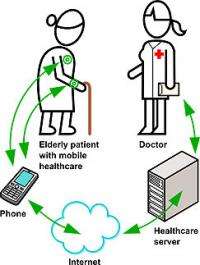A new system architecture speeds up the use of mobile phone applications

When a phone is used to scan a smart tag on a concert ticket, the band’s latest music video and interviews appear on the screen. Although the slow speed of data transmission in a phone network and high power consumption have hindered the use of such smart phone applications until now, downloading can soon be possible in just a few seconds. In his dissertation, Iiro Jantunen developed an open system architecture that transmits data from network to telephone at a faster rate.
A smart phone is an interface through which a person can browse digital content embedded in the environment, otherwise known as ubimedia. For example, a ubimedia tag can be embedded in an advertising poster in place of a network address. Scanning this smart tag makes it possible to download material from the network. The architecture developed by the researchers can be used to generate a battery-free smart tag from which the data can be downloaded directly to the phone faster and with less power use, without using the telephone network.
The system architecture developed by Jantunen and his research group also allows a new type of high-speed wireless internet access that conserves the phone's battery and makes it possible to get the maximum benefit from smart phone applications. The connection was demonstrated at a speed of 112 Mbit/s, but it can be scaled to a higher speed as well.
"We developed the technology based on the user needs: for example, we started with a user's desire to download and run a 3-minute video clip on a phone display with a wait of less than 10 seconds. Earlier that time was needed just to initiate a 3G connection or start Wi-Fi, to say nothing of how long it took to actually download the data. The increase in video resolution and file size makes high-speed data transmission even more important," explains Iiro Jantunen.
Lighter local networks for health care
Bluetooth and Wi-Fi technologies consume too much power and computing capacity to be used in devices with a small power source, such as heart rate monitors. As part of his dissertation work, Jantunen built a test apparatus that was used to test and develop a lighter Bluetooth technology for such devices.
The system architecture made it possible to use short-range wireless sensor networks for various health-related applications. This allows healthcare professionals to remotely monitor a patient's heart rate, blood sugar or check that a patient with memory problems has taken their medication. The technology is also suitable for personal health monitoring and sports applications.
The benefits of this lighter Bluetooth technology, BTLEE (Bluetooth Low End Extension), are lower power consumption and cheaper components due to the simplicity of implementation. In 2010, it was included in Bluetooth standard version 4.0 under the name 'Bluetooth Smart'.
"It's great to see that one of the products of my dissertation is already widely used in consumer products," says a delighted Jantunen.
A mobile phone-based remote healthcare system links the sensors on the patient to a healthcare service where they can be used by healthcare professionals in real time.
More information: Iiro Jantunen's dissertation takes place at Aalto University School of Electrical Engineering on Thursday 14th June 2012. The title of the thesis is "System Architecture for Mobile-phone-centric Ambient Intelligence Applications".
Provided by Aalto University
















